Common ground
On Auckland’s North Shore, two families are reviving the lost art of being neighbourly.
Lisa Joe, her husband Justin Hamlen and their two girls Lucy (6) and Coco (4) live next door to retirees Liz and Ken Clark in a leafy cul-de-sac in Northcote. The two families have only been neighbours for three years but in that time have developed an enduring friendship, boosted by a shared affection for raising chickens.
Gardening is Liz’s first love. Eight years ago she completed a garden design course at Unitec so when she moved into her “1960s boomerang” house, she was keen to put her own stamp on it.
“My garden is eclectic and breaks many ‘rules’. When you learn how to design gardens, you learn about colours, spaces, rhythms and are given guidelines to follow. I do obey them, but only if it suits me!” she laughs.
An example of where Liz says she’s “broken the rules” is in her front garden. Coleonema Sunset Gold, a conifer type plant sits beneath Kowhai trees, surrounded by grasses and citrus. “What I’ve ended up with is a series of yellows, which looks quite cute. The Coleomena is a nod to the house’s history as it’s a plant from the 1960s. To put a conifer with a Kowhai is definitely not obeying the rules of landscape design but it does tie in with the era of the house and the garden.”
On the other side of the fence, Lisa has a different approach to gardening. Working full time with a young family means she has prioritised “growing what we can eat”. As the grand-daughter of two generations of market gardeners, Lisa is an adept vegetable gardener with an impressive plot growing “the usual suspects” as well as a few not-so-common veges and herbs including Carolina Reaper, the world’s hottest chilli, which Lisa has to harvest with gloves on.
The neighbours got to know each other easily, instigated by Lisa’s welcome present of baking to Liz and Ken when they moved in. Conversations over the fence quickly turned to gardening and chickens, the latter a subject Liz has been passionate about for many years.
“I was keen to keep chickens as we had done in our previous homes, but at the time
I didn’t think we had a practical space for them. The section was overgrown with big trees and weeds, but there was certainly potential. Then Easter came and I thought it would be fun for Lisa’s girls to hatch some eggs. I suggested to Lisa that if she hatched the eggs, I would keep the chickens. She agreed and took the project on with great enthusiasm, buying an incubator and sharing the whole process with the girls’ local day care centre,” says Liz.
“My main motivation was to have a constant supply of free-range eggs,” says Lisa. “What I didn’t know at the time was how the chickens would be a conduit to a blossoming relationship between neighbours. Through gardening and keeping the chickens, we are also able to teach our children about life cycles, and also about where our food comes from.”
Liz concurs. “Neighbourly interaction has increased since we’ve had the chooks. One of our other neighbours is not an animal person, but she’s enjoying the fact the chickens are eating her scraps and has even offered us some of her land for the chickens to roam in. We are continuing a tradition of sharing land and produce that was instilled by the previous owners of the house,” she says.
The two families now have 10 chickens between them, with the chook run and houses straddling both their properties. For people wanting to keep chickens in an urban setting, Liz suggests getting the book ‘Lifestyle Block: How to Care for your Poultry’. “It’s the perfect book for anyone starting out. It has guidelines on how to keep a chook healthy and happy and is my go-to book still.
“You don’t need a lot of space for chickens but they should have a nice environment to live in with different textures, smells and tastes. In Auckland, the number of chickens you can keep in a residential zone is six per section. If you’ve got a square of lawn, you can have a run and a house. Mind you, you’ll have to choose between the garden or the chickens - it’s best if they’ve got their own area to play in and keeps your garden intact!”
Liz’s husband Ken built the two chicken houses, each with its own identity. “Lisa’s is modern and fashionable, just like her, while mine is more rustic,” laughs Liz. “I designed them though, according to the principles in the book. The reason we have two houses is that often incubator-raised chickens have trouble being accepted and need to be separated for a while. The second house also acts as ‘time out’ for wayward behaviour and quarantine.”
As well as being “maintenance man”, Ken is also “director of vegetables” according to Liz. He’s allowed a small corner of her garden for his vege patch, although Liz says he’s “stretching it into places he shouldn’t and thinks I won’t notice.”
Ken is also known to “freelance” around both gardens. Recently chilli plants mysteriously appeared in a spot where Lisa’s kumara hadn’t yet sprouted. “Ken knows we love our Asian cooking and planted them – Lucy calls it “another one of Ken’s magic tricks”, says Lisa.
Liz collects the eggs daily, leaving a basket full on Lisa’s doorstep. “It’s a great excuse to catch up with her,” says Lisa.
The division of labour between Liz and Lisa is natural and organic. “Lisa goes and buys seedlings and helps when time allows – she has a very busy life. I don’t work so I have time and that’s my choice. I do it because I love it and will spend at least 20 hours a week in the garden. If we’re away, Lisa picks up the reins and looks after the chickens and the garden.”
“I love that idea of co-operation - it’s what we’re lacking in society. Co-operation allows you to enjoy and share people too. If I’ve got something that I’m not using or can be used by someone else with respect and care, why wouldn’t you share it?” Liz muses.
Her philosophy of co-operation and sharing extends to her verge, where she’s planted silverbeet and parsley for anyone to help themselves to.
“I believe that as people’s lives have got busier and busier, often we don’t even know our neighbours, but I sense that’s changing. Sharing the load means we can go away and I know Lisa will look after the garden.”
“The Clarks are just wonderful neighbours,” smiles Lisa. “I’m constantly asking Liz about plantings, companion plants, what would look good where and about maintenance, especially what to add to the soil and the best spots for my plants. She helps me a lot with my garden.”
Recently Liz planted lavender, hydrangeas, daisies and flax along Lisa’s driveway. “Technically it’s our driveway and Liz’s flower bed, which she can’t see from inside the house,” explains Lisa. “Liz has taken it on as her own and planted to make it pretty. She’s done it for us rather than for her benefit - and we utterly appreciate it.”
“Lisa has renewed my faith in what it means to be neighbours. She brings modernism and new ideas to me. You couldn’t actually wish for a better neighbour. Her bubbly enthusiasm, encouragement and baking keeps our relationship alive!” laughs Liz.
“We’re all living closer and closer to each other in the city and we need to do this neighbour thing better than ever. It’s a dying art.”
CULTIVATING COMMUNITY
Social contact has long been recognised as a springboard to happiness and self-esteem. While the act of gardening in itself is known to foster a sense of well being, it also brings people together.
A perfect venue
Even for those who enjoy gardening mainly as a solo pursuit, what we end up with is a space we can delight in sharing with others. There is no better venue for a weekend barbecue or coffee with a friend.
The art of collaboration
When there is a puzzle to be solved, two or three heads are usually better than one, even if all parties are relatively new to gardening.
Sharing knowledge
Most experienced gardeners love to share their knowledge. In particular, there is surely a huge untapped resource among older gardeners who could offer their wisdom in return for friendship and the opportunity to feel useful.
Sharing plants
Gifting and swapping plants, seeds and cuttings is an enjoyable part of gardening and it’s been building communities for centuries.
Practical matters
When the garden needs watering or the chooks need feeding, friendly neighbours can depend on each other.
Common cause
It might be a working bee in the local school grounds,
a conservation planting, a community food garden or a volunteer cleanup day. When there’s a job to be done people are united by a collective goal.
Garden shows and festivals
Garden shows and generous individuals who open their private gardens to visitors create more opportunity for social interaction with like-minded others.
1-Mar-2016
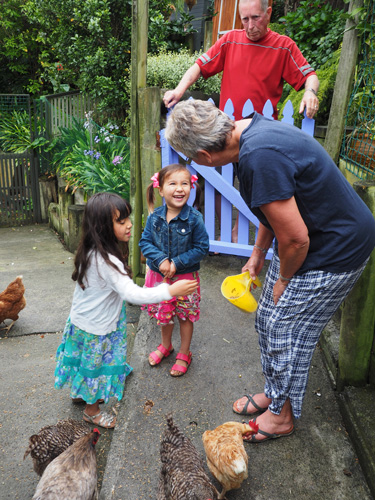
Hanging out with the hens
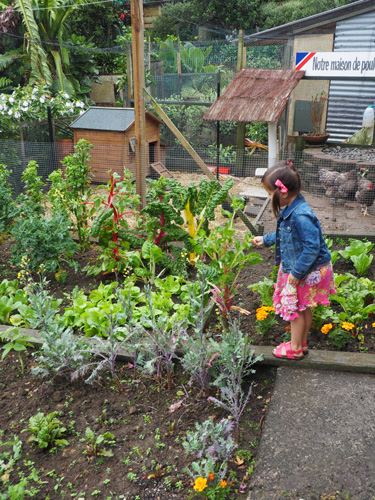
Lisa's vege garden
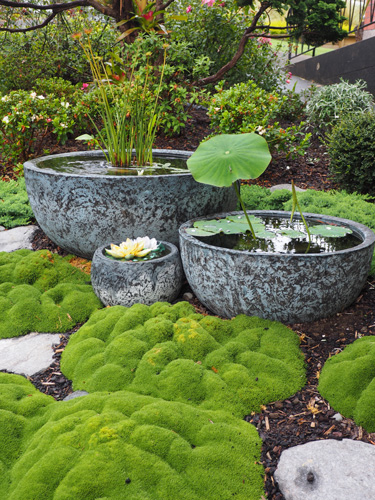
Liz's Japanese style garden features bright green Scleranthus groundcover and water in pots
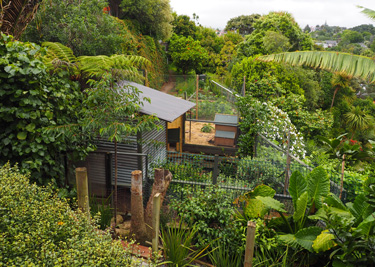
Ken built the chicken house from recycled materials
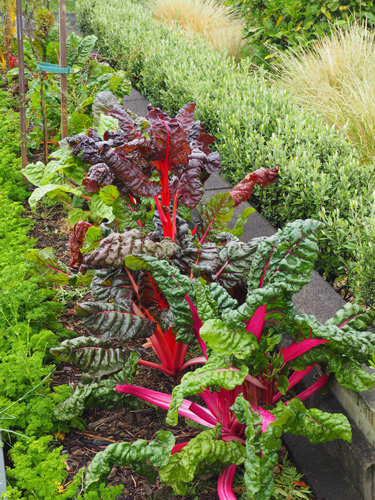
Parsley and rainbow chard grow brightly in a border in front of a Corokia hedge


